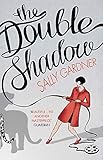
Price: £7.99
Publisher: Product type: ABIS BOOKBrand: Orion Children's BooksGardner, Sally (Author)English (Publication Language)
Genre: Fiction
Age Range: 14+ Secondary/Adult
Length: 416pp
Buy the Book
The Double Shadow
Proust and the madeleine biscuit are explicitly present here, for times remembered are at the core of this novel. There may well be a borrowing from Pip’s Satis House humiliation by Estella; and echoes of Eliot’s Waste Land – perhaps the falling towers of the Unreal City. Yet though this is a playful, riddling, allusive text, the novel does not tease you to rake through a ‘heap of broken images’ – there is a pleasure in having merely a sense of an echo here and there, for echoes and half-memories run through the text. Rather, the book asks its reader to set out on a journey with a risk-taker; here, we are in the company of a searching mind, eager to take chances with ideas, with plot, with language itself. There are no concessions. The plot is increasingly non-linear – flashbacks illuminate and alter what we thought we had understood. Towards the end, the narrative voice switches from one character to another, and back to the third person – blink, and you’re lost. Able teenage readers will need to enjoy being alert, to welcome the demands being made upon them.
It’s tricky to indicate briefly a plot as crowded and complex as this web of a story. Things start just before World War II and finish on V.E. Day. The period is important, for the shadow of the Great War hangs over several of the older characters; the sleazy 1930s pleasures of the empty rich stand in contrast to the lives of working folk; the threat of fascism and the events of the second war – all these are integral to the story. It is in this context that Jewish American millionaire, Arnold Ruben, seeks to protect his daughter Amaryllis from the uncertainties of adulthood. Even stronger, however, is his drive to satisfy his lifelong craving to create a ‘memory machine’. Essential to his experiment, his daughter will be placed at the machine’s centre, fixed in time, her mind filled with happy memories of her childhood. Ruben’s naïve picture of that childhood excludes the drowning of her tipsy, vacuous mother, and the absence of any family warmth. By contrast, working-class Ezra’s home is strong and steeped in love, his mother at its heart, caring for her two children and a husband tortured by the ghosts of the Flanders trenches.
Drawn by a glimpse of that homely warmth, Amarylis meets Ezra. They move slowly from uncomprehending antipathy towards understanding and then, after many excitements and twists of the plot, towards maturing love; a process observed by Sally Gardner as delicately and poignantly as you could wish.
The density and surprises of the plot make any summary almost impossible – the above may well read as banal. It won’t help if I add that a ten foot long tiger makes regular appearances throughout the novel, occasionally seeming to speak. On a first reading, the narrative sometimes seemed confusing; yet also absorbing, entertaining, puzzling and disturbing. A second reading, which this book virtually demands, revealed how tight the plotting actually is, though a reader must sometimes wait 200 pages for a fragment of plot to become clear. The Double Shadow is at once thriller, love story, and an exploration of memory and forgetting (‘what is the use in editing the past, if all it does is make the well of forgetfulness more terrifying?’) I thought it extraordinary – one of those rare novels published for young readers where we are admitted to a secondary world charged with its writer’s exceptional intelligence of both mind and emotion.


 IBC
IBC